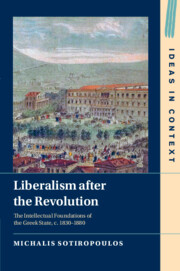Book contents
- Liberalism after the Revolution
- Ideas In Context
- Liberalism after the Revolution
- Copyright page
- Contents
- Acknowledgements
- Note on Transliteration
- Abbreviations
- Introduction
- Chapter 1 Mind the Legal Gap
- Chapter 2 ‘Romanist’ Jurisprudence
- Chapter 3 ‘It’s More Than Economics, Stupid’
- Chapter 4 ‘Let’s Talk about the Nation and the State’
- Chapter 5 The Law of Nations, Sovereignty and the International Autonomy of the Greek State
- Chapter 6 Ideas into Practice
- Conclusion
- Bibliography
- Index
Chapter 3 - ‘It’s More Than Economics, Stupid’
Political Economy and the Limits of ‘Industrial’ Economics (1840s–1860s)
Published online by Cambridge University Press: 01 December 2022
- Liberalism after the Revolution
- Ideas In Context
- Liberalism after the Revolution
- Copyright page
- Contents
- Acknowledgements
- Note on Transliteration
- Abbreviations
- Introduction
- Chapter 1 Mind the Legal Gap
- Chapter 2 ‘Romanist’ Jurisprudence
- Chapter 3 ‘It’s More Than Economics, Stupid’
- Chapter 4 ‘Let’s Talk about the Nation and the State’
- Chapter 5 The Law of Nations, Sovereignty and the International Autonomy of the Greek State
- Chapter 6 Ideas into Practice
- Conclusion
- Bibliography
- Index
Summary
This chapter explores the formation of an early ‘constitutionalist’ liberal current, by concentrating on Greek political economy. It starts by discussing the diffusion in the Greek world of an economic idiom, inspired by J. B. Say and Saint-Simonism, that concentrated on values such as industriousness and frugality as the organising principles of economy and society. It shows how this idiom complemented that of ‘public economy’ that informed Bavarian policies. The chapter then turns to Ioannis Soutsos, discussing how, from the 1840s onwards, he raised concerns about the obsession with economic virtues and argued for the benefits of institutional change and political participation. Drawing on the republican thought of Simonde de Sismondi and Pellegrino Rossi, Soutsos related industrie to political rights, called for large-scale reforms (including land redistribution) and associated political economy with the science of government. These calls increasingly targeted the monarchy, as reforms ground to a halt and the issue of land took on explosive dimensions. The chapter shows that ideas about state intervention in the economy and the view of economics as a science of government remained in fashion long after 1848, when they had lost their appeal elsewhere.
Keywords
- Type
- Chapter
- Information
- Liberalism after the RevolutionThe Intellectual Foundations of the Greek State, c. 1830–1880, pp. 96 - 131Publisher: Cambridge University PressPrint publication year: 2022

